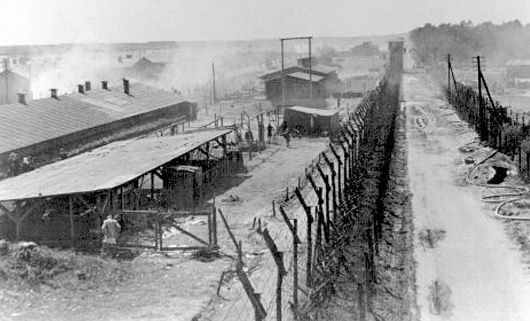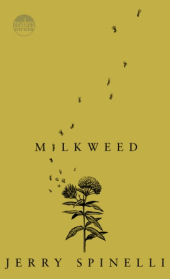Young adult holocaust literature


Christen Hughes
Dr. Perry
EDR 441
9 February 2016
Milkweed
Spinelli, Jerry. Milkweed. New York: Laurel-Leaf, 2003. Print.
Milkweed by Jerry Spinelli is a Holocaust-genre novel that focuses on an 8-year-old boy’s survival during Hitler’s reign. The book is set in Warsaw, Poland, and the boy is identified by many different names. Jew, Gypsy, “Stopthief,” and filthy son of Abraham are just a few names his friends and others call him. He maintains innocence on his surroundings, while his main focus is stealing food for his friends and others. On his first few adventures he encounters a “Jackboot,” or Nazi soldier, and does not realize exactly why the Jackboot is there or why he has stopped him. As he tells the story to his friend Uri, he asks him if he a Jew; the boy is unsure of who he is. However, since Uri told him he is a Jew, that is what he believes. The boy’s ever-changing name is continuous throughout the book. On one of his nightly searches for food, the boy makes new friends and collaborates with them as they adapt to their new surroundings. The boy is oblivious to the Nazi’s control in Warsaw until he sees the trains coming to get other people like him (Jews). The book portrays the horrific lives Jews lived while under the Nazi’s power. The boy eventually finds his identity, all while saving other Jews from Hitler’s wrath. The prevalent themes/motifs included in Milkweed are identity, survival, friendship, caring, and invisibility.
The protagonist in Milkweed, Misha, has his identity given to him by his peers throughout his life. Whatever his peers tell him he is, that is what he believes; therefore, Misha shows signs of fidelity throughout the book. In Conflict and Connection: The Psychology of Young Adult Literature, Sharon Stringer states that “Fidelity illustrates how individuals can be pulled toward something without fully understanding why until later” (9). For example, at the beginning of the book Misha meets his friend Uri while they are stealing food. The Jackboots are yelling “Stop! Thief!” as he continues running with his friend. When they get to their destination and Uri asks his name, Misha has no idea. Uri gives him the name “Stopthief,” and that is how he is identified for months. The protagonist lacks the ability to achieve his identity because he has never had the opportunity to discover himself, or even learn is real name. The discovery of his identity is very slow and gradual throughout the book. Stringer says, “people who attain identity gradually discover a cause, goal, or set of values that give purpose and meaning to their lives,” which is exactly what happens to Misha (9). He does not become confident with his identity until the end of the book when he becomes a great-grandfather. In contrast, Misha does not understand why he is constantly being identified by different names – even the most important one, Jew. He does not realize the importance until later when the meaning is relevant to who he wants to become.
Survival is another prevalent theme throughout Milkweed. Stringer states the “most significant changes occur gradually” for protagonists who face survival, which is true in Spinelli’s novel (93). It takes years for Misha to finally discover his true self, which is a result from era he is living in. In Misha’s case, he illustrates the theme of survival by stealing food for himself and others when the Nazi’s are taking it away. He steals food every night to survive which distracts him from focusing on himself. In a time where you must do anything to survive the conditions, Misha is forced to choose between living and discovering himself.
Jerry Spinelli Books
Stargirl (2000)
Maniac Magee (1990)
Love, Stargirl (2007)
Loser (2002)
Wringer (1997)
Crash (1995)
Eggs (2007)
Smiles to Go (2000)
Jake and Lily (2012)
The Library Card (2012)
Fourth Grade Rats (1991)
Who Put That Hair in My Toothbrush? (1984)
Knots in My Yo-Yo String: The Autobiography of a Kid (1998)
Hokey Pokey (2013)
There’s a Girl in My Hammerlock (1991)
Report to the Principal’s Office! (1991)
Space Station Seventh Grade (1982)
Third Grade Angels (2012)
Who Ran My Underwear up the Flagpole (1992)
Jason and Marceline (1986)
Do the Funky Pickle (1992)
I Can Be Anything! (2010)
Picklemania! (1993)
Mama Seeton’s Whistle (2015)
Today I Will: A Year of Quotes, Notes, and Promises to Myself (2009)
My Daddy and Me (2003)


